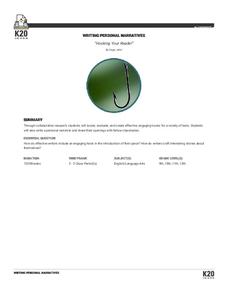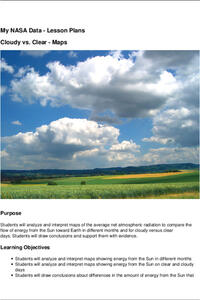National Geographic
Types of Volcanic Eruptions
Blow the roof off your classroom with this multimedia science lesson on volcanic eruptions. A short online video teaches young geologists about shield and composite volcanoes and explores the examples of Kilauea and Mt. Vesuvius, before...
National Endowment for the Humanities
Dostoevsky's Crime and Punishment
Pain and suffering do not have to be inevitable in a study of Crime and Punishment. A carefully scaffolded lesson introduces readers to the divided natures of the characters in Fyodor Dostoevsky's complex novel. Groups use the provided...
National Endowment for the Humanities
Literary Genres in “Moby-Dick”
Moby Dick is more than a whale of a tale narrated by Ishmael. A lesson studying Herman Melville's classic novel asks readers to examine the different genres the author weaves into his story. Instructors model how to conduct a stylistic...
National Endowment for the Humanities
Characterization in Lord of the Flies
Readers of Lord of the Flies hunt down direct and indirect examples of how William Golding brings his characters to life. After instructors guide learners through the process of collecting evidence of these two types of characterization...
National Endowment for the Humanities
Symbolism in Lord of the Flies
Readers of Lord of the Flies examine the four main symbols William Golding develops in his novel: the island, the conch, the Lord of the Flies effigy, and fire. Partners select one of the major symbols and create an image by adding words...
National Endowment for the Humanities
Edgar Allan Poe, Ambrose Bierce, and the Unreliable Narrator
Stories by Edgar Allan Poe and Ambrose Bierce provide readers with an opportunity to investigate unreliable narrators. The lesson plan begins with an activity about different types of point of view and continues as scholars apply their...
National Endowment for the Humanities
African-American Communities in the North Before the Civil War
Middle schoolers may be surprised to learn that before the American Civil War there were more slaves living in New York than there were in Kentucky! Young historians examine maps and census data to gather statistics about...
Newseum
Is It Fair?
Young journalists learn how to analyze word choice, context, and counterpoints to judge the fairness of a news story. They practice using these tools to judge a series of headlines for the story of Goldilocks and the Three Bears. They...
K20 LEARN
Hooking Your Reader
Hook your class into inquiry-based, hands-on learning with a activity on narrative leads. Pupils research different types of hooks and decide which one to use in their own writing. Carefully scaffolded to include all learners, the...
DocsTeach
Women of Color and the Fight for Women's Suffrage
Introduce young historians to primary source analysis with a lesson that teaches them how to use a four-step process to analyze a photograph of a 1913 Suffrage Parade. Groups practice the process and share their observations with the...
K20 LEARN
Power To The People: Bill Of Rights Art
The works of Juane Quick-to-see Smith are featured in a instructional activity that asks pupils to consider the role artists play in bringing about social and political change. Scholars examine protest art by Smith and several street...
British Council
Film Reviews
Scholars work in pairs to discuss a film they have both seen by answering 10 questions about the movie. They then individually work on a film review worksheet using a different film than the one previously discussed with a partner.
NASA
Cloudy vs. Clear - Maps
Find out the science of how clouds keep Earth cooler on hot days. Using guided discussions, investigators analyze and interpret maps of how much solar energy Earth receives at different times of the year. Participants draw conclusions...
NASA
Comparing Temperature and Solar Radiation for Common Latitudes
There's snow much to learn! Excited individuals use real-world data to discover how latitude affects the odds of a snow day. Scientists compare latitude, solar radiation, and temperature using NASA data for several locations....
NASA
Using Models in Climate Change Research
Explore models through the relevant lens of climate change! Investigators watch a video about using models and their application for evaluating temperature data and climate change. Scientists read an article on climate change and answer...
NASA
Seasonal Science: Building Claims from Evidence
A lot can change in a year! Investigators observe a video of Earth over the course of a year and complete a KWL chart. Astronomers view a second video, participate in a guided discussion, and discuss the rubric for successfully...
Facebook
Versions of Media Texts
Verification of provenance and the original source of an image or video can be a long and winding process. Young journalists learn about the difficulty of finding the original source of a scrape, a copy of an original news story, and...
Facebook
The Verification Steps
Provenance, source, date, location, and motivation. High schoolers learn how to verify the authenticity of news stories and posts by following a seven-step process. They then use the strategy to determine the original site that posted a...
Franklin D. Roosevelt Presidential Library & Museum
Civic Holiday Work Sheets
Everyone loves a day off, be it a national or statutory holiday or a civic holiday. The final resource in a 10-part civics series features 14 worksheets of the type given to young visitors at the Franklin D. Roosevelt Library and Museum....
Franklin D. Roosevelt Presidential Library & Museum
What Does It Mean to be a Good Citizen?
Civics scholars are challenged to determine what it means to be a good citizen. Class members select three adults in their lives and interview them to discover what the term "good citizen" means to each of these people. The class then...
Flipped Math
More Probability
Multiply the amount of probability using addition. Pupils use probabilities to make predictions in problems. They find shortcuts to find probabilities instead of listing the entire sample space. The learners then use the multiplication...
Flipped Math
Introduction to Probability
Chances are high that the class will probably like the lesson. Pupils view an introduction to probability and use the information to find probabilities of simple events based on the sample space. Scholars then use their knowledge of area...
Flipped Math
Unit 11 Review: Circles
Solve problems around a circle. Pupils watch a video that shows how to apply concepts about circles and related angles and segments to find solutions to word problems. Learners then review the different concepts from the unit in...
Flipped Math
Secants and Tangents
Put the vertex in, put the vertex out. Pupils explore theorems about the relationships of lengths of segments and angles of line segments that intersect inside or outside the circle. Learners use the theorems to solve problems involving...

























